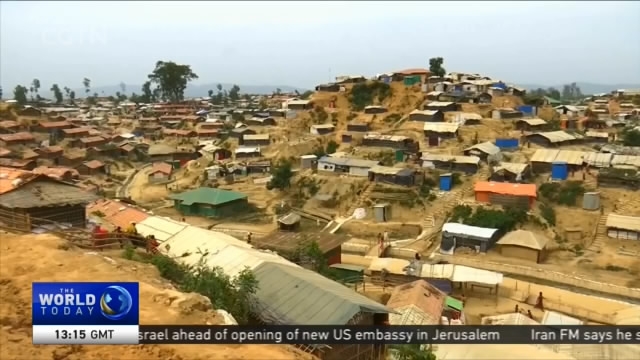
21:38, 13-May-2018
Rohingya Refugees: Monsoon season threatens to hit refugee shelters in Bangladesh
02:01

With monsoon season approaching, concerns persist about the safety of Rohingya refugees in Bangladesh. Many of them are sheltering in areas that are at risk of landslides. Dave Grunebaum has the story.
Workers and families build new shelters at refugee camps in Bangladesh near the border with Myanmar, and strengthen existing ones. They use sandbags and dig ditches.
NOOR JAHAN ROHINGYA REFUGEE "My house was very weak before. With the monsoon coming, we're scared. So we're rebuilding the house."
EDWARD BENSON UNITED NATIONS REFUGEE AGENCY "We should absolutely mentally and operationally plan for the worst case scenarios in terms of some enormous challenges that we may face."
There are concerns about flooding and landslides. Thousands of households need to be relocated because they're staying in vulnerable areas.
EDWARD BENSON UNITED NATIONS REFUGEE AGENCY "The one unknown quantity and this is perhaps the most concerning thing is the issue of a cyclone. Obviously If a cyclone were to come that is a whole additional series of problems."
DAVE GRUNEBAUM YANGON "The Rohingya refugees are in Bangladesh after fleeing a counter-insurgency campaign in Myanmar. The United Nations has accused Myanmar's army of ethnic cleansing. Accusations the military denies.”
Almost 700-thousand Rohingya refugees have fled Myanmar since August. They're now staying in crowded camps, dependent on humanitarian aid for the basics such as food, water and medical care. The task of taking care of their daily needs and preparing for the problems that lie ahead is quite a challenge. Edward Benson spent six weeks recently working in the camps in Bangladesh.
EDWARD BENSON UNITED NATIONS REFUGEE AGENCY "I've been doing this work since 2002, as compared to dealing with the immediate aftermath of the Asian Tsunami, the earthquake in Haiti, the Mali refugee crisis and being in Niger this is as complex as any situation I've dealt with."
A complex situation with hundreds of thousands of lives at stake. Dave Grunebaum, CGTN, YANGON, MYANMAR.

SITEMAP
Copyright © 2018 CGTN. Beijing ICP prepared NO.16065310-3
Copyright © 2018 CGTN. Beijing ICP prepared NO.16065310-3